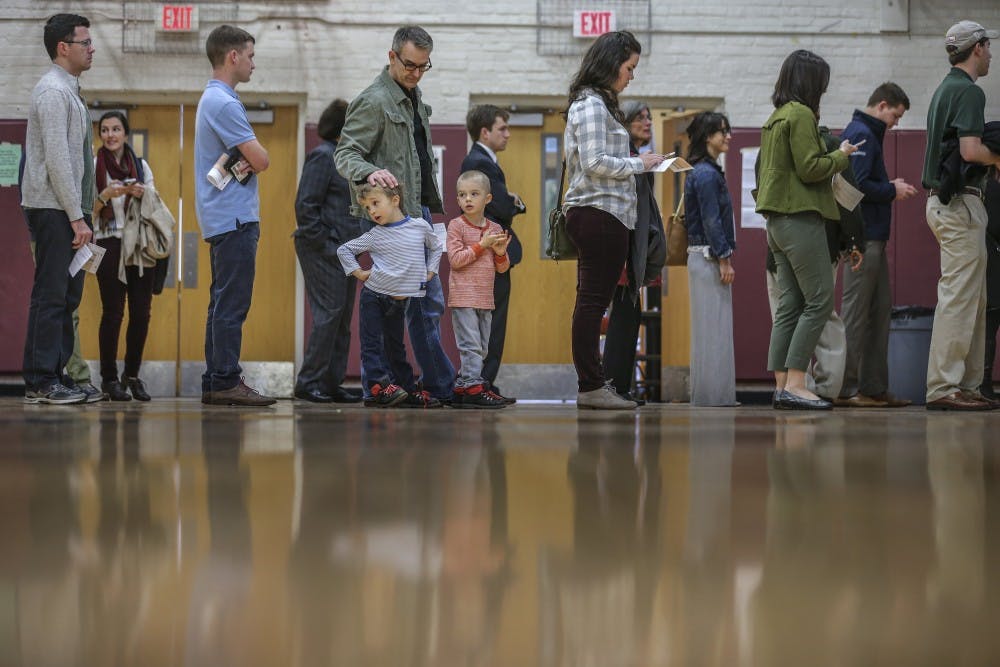Daily News Election Poll Results
Of 1,000 survey participants:
- 58.10 percent plan to vote for Hillary Clinton
- 22.17 percent plan to vote for Donald Trump
- 8.4 percent plan to vote for Gary Johnson
- 3.64 percent plan to vote for Jill Stein
- 2.94 percent are undecided
- 2.52 percent are not voting for president
- 2.23 percent plan to vote for another candidate
Demie Johnson, Newslink Indiana
It’s not an ideal presidential election for many first-time voters at Ball State.
Daily News Election Poll survey results from 1,000 members of the Ball State community reflect that more than 85 percent of participants are planning on voting Nov. 8, but 82 percent of survey participants also said they were either “not too satisfied” or “not at all satisfied” with the 2016 presidential nominees for president.
“This is my first election voting, and it’s a massive disappointment,” said junior social studies education major Austin Glaub. “Both of the major party presidential candidates are inherently unfit for the office.”
With a whirlwind of rumors and accusations making their way through his newsfeed, Glaub said he’ll vote for president, but isn’t happy about the choices. Instead, he’s more concerned about voting his party’s candidates into Congress, hoping the real change will happen outside of the Oval Office.
“As a conservative, I'm especially disappointed that the conservative party nominated an amoral demagogue who doesn't know the first thing about authentic conservative thought,” Glaub said. “We're not going to ever get good candidates if people don't just stop supporting someone because of the ‘R’ or ‘D’ next to their name.”
Michael Wiseley, a freshman marketing major, is also fresh to the election scene. He said his choice to vote wasn’t difficult, but his decision on a presidential candidate hasn’t been ideal.
“I think we really are not in a good place,” Wiseley said. “We've basically been thrown in to decide the lesser of two evils, or vote third-party knowing that they won't win.”
With mere hours until election day, Wiseley said he wished voters could return to the primaries and “start over” with different candidates.
“I think a large amount of people voted for Donald Trump and Hillary Clinton back [in the primary] without knowing the full circumstances that we are facing now,” Wiseley said. “A lot of better-fit, first-party candidates slipped through because of it being, essentially, a popularity contest, and things just sort of fell into place. Now I see a lot of regret in people's decision and fear for the future.”
Those in the Ball State community are not alone in their frustration, however. Joseph Losco, director of the Bowen Center for Public Affairs, said the feeling is trending nationwide.
“It’s a national feeling of dissatisfaction,” Losco said. “Clinton and Trump are the two candidates with the highest unfavorable ratings in history.”
But regardless of the disappointment, millennials are still expected to vote — and in record numbers, according to some researchers. The U.S. census reported those in their 20s and early 30s are the largest generation in the country, with an estimated population of 83.1 million.
At the polls, millennials are anticipated to rival baby boomers as a potential political force, making up about 31 percent of the electorate.
“We don’t know what the turnout is going to be yet, but it may surprise us,” Losco said. “Millennials could have a big say in the election, it just depends on how many choose to vote.”
Despite the potential millennial pull on election results, glaring disagreements between supporters of the two presidential front-runners still exist.
Ryan Butler, a graduate student at Ball State, said while Trump might not have been his first choice for presidential candidate in the primary, but now, he’s the best pick for the job.
“I am voting for Donald Trump because I agree with nearly all of his policies, unlike those of Hillary Clinton,” Butler said. “I am willing to overlook Trump's character flaws, but I am not willing to overlook Hillary Clinton's negligence that puts our national security at great risk.”
Butler said while it’s been “one of the most entertaining” elections to date, he wishes the election offered voters candidates who did not have so much “baggage.”
“I am a Bible-believing Christian, and it guides my voting 100 percent,” Butler said. “Does Trump embody a Christian attitude or lifestyle? No. However, he does embody what I feel are policies that most closely reflect my Christian values.”
Freshman psychology major Gabby Sellers has different thoughts about her presidential candidate of choice. With her vote for Clinton already secured, Sellers said she’s hoping her vote will still help make history.
“I'm voting for my candidate because she's not Donald Trump,” Sellers said. “Even though she has done some things that I don't approve of, I feel like she would be a much better president for the people, seeing that she hasn't insulted more than half of the United States population.”
After having been the victim of racially charged insults during her first few weeks on campus, Sellers said Trump’s comments toward minorities have resonated with her personally and will “never be acceptable."
Regardless of her reservations with the Democratic candidate, Sellers said she refuses to give up her opportunity to vote and is focused on the overall impacts the next president will have on the country.
“I do wish some things were different with this election, but this is how things turned out,” Sellers said. “No matter what, I am very excited for the election, because as a black woman, many people had to fight for my right to vote, and it feels great to be able to exercise my right. I’m not giving that up.”





